Writing her own success story
08/15/2013 10:45AM ● By AclAfter learning about the caged grave in Catawissa, Pa., Salerni took a trip to visit the site and discovered that there were, in fact, two graves that were enclosed for unknown reasons. “One caged grave is weird, but two is a story,” she said.
By Steven Hoffman
Staff Writer
The next chapter of Dianne Salerni’s life promises to be an exciting one.
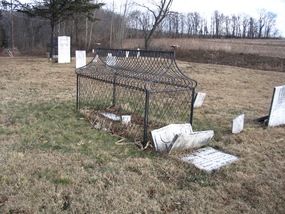
A teacher in the Avon Grove School District for the last 24 years, Salerni followed up her 2007 debut novel, “High Spirits,” with the publication of “Caged Graves” in May of this year. She has already completed work on her next novel, “The Eighth Day,” which will be published by HarperCollins in 2014. It is expected to be the first book in a series.
For Salerni, who grew up aspiring to be two things—a teacher and a writer—obtaining a multi-book deal with a major publisher is a dream come true. She welcomes the challenge of teaching a classroom full of students during the day and writing at night.
“I’ve been writing all my life,” Salerni said. “In my life, I only ever wanted to be a teacher or an author. My biggest obstacle to becoming an author was not taking the risk.”
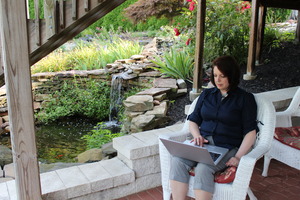
That’s not a problem anymore. These days, Salerni doesn’t like letting even one long, summer day go by without making edits to the second book in “The Eighth Day” series, plotting out storylines for the third book, or exploring some new story possibility.
Salerni spent years writing whenever she got the chance before she started gaining momentum as a writer. She completed at least three novel-length manuscripts before self-publishing “High Spirits” in 2007. That work was based on the real-life exploits of 14-year-old Maggie Fox and 11-year-old Kate Fox, sisters who gained great notoriety when, in the mid-19th century, they claimed to have the ability to communicate with the dead. Managed by their older sister, Leah, the sisters became sensations as they traveled the country and played to large crowds. They were likely responsible for coining the term “medium” and are often viewed as the founders of the spiritualism movement.
Salerni was intrigued by the Fox sisters’ story and she decided to build an historical romance around them, blending fiction with the long-running hoax that the sisters were able to perpetrate.
As Salerni was writing the book, she started using the manuscript in the classroom, showing the Avon Grove Intermediate School students the descriptive passages, and teaching them how to plot a book and make revisions. She found this to be an effective teaching tool because the students were interested in the book and the behind-the-scenes look at how an author goes about her work.
“They really get invested in the process,” Salerni said.
Away from the classroom, she spent about two years promoting her debut novel. By 2010, she
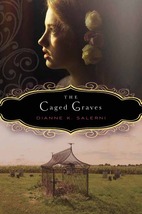
thought that she was about to leave the story of Maggie and Kate Fox behind. But then “High Spirits” was picked up by Sourcebooks Fire and published under the title of “We Hear the Dead.” The new title was a suggestion by one of Salerni’s students, an illustration of how much she keeps them involved in the process.
Next, a production company optioned “We Hear the Dead” for a full-length movie. Salerni was briefly involved in crafting a screenplay for the movie, but the production process proved to be long and winding. Eventually, a new production team was brought in to make a 10-minute short film based on the characters in the book. The short film premiered at the Cannes Film Festival in 2013.
That wasn’t the only exciting development in Salerni’s writing career. Sara Crowe, a literary agent, took her on as a client and started marketing her work. The manuscript that Salerni wrote immediately after “We Hear the Dead” didn’t draw any interest from publishers, but she was undaunted. After starting and setting aside a few different writing projects, Salerni saw a brief article on the Internet about a grave that was enclosed in a cage. She developed this idea into what would become her second published novel, “Caged Graves.” This book, which was published by Clarion/HMH, is a historical mystery inspired by actual events that took place in Catawissa, Pa., a small community in Columbia County. While doing some more research, she came across several theories about why the graves of two sisters-in-law might be enclosed. One theory was that relatives believed that the deceased had been vampires or werewolves.
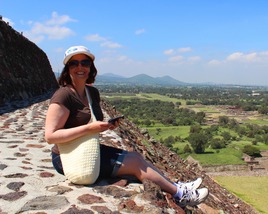
Salerni’s husband, Bob, suggested that they take a trip to see the grave. It was just one of many times that he has helped her with a writing project at a crucial moment. When they finally visited the grave in Catawissa, Salerni was in for a surprise.
“There wasn’t one caged grave, there were two. One caged grave is weird, but two is a story,” she said. “The reason that the graves were in cages has been lost to history.”
Salerni developed a story around 17-year-old Verity Boone, who expects a warm homecoming when she returns to Catawissa, Pa. in 1867. She has pledged to marry a man she has never met and returns home to find a father who she barely knows and a future husband with whom she has almost nothing in common.
Then she discovers that the graves of her mother and aunt are enclosed in iron cages outside the local cemetery. Nobody in town will explain why, but Verity hears rumors of buried treasure and witchcraft. The book was a Junior Library Guild Selection.
Even before “Caged Graves” was published, Salerni was hard at work on her next novel.
Salerni came up with the idea for what would turn out to be a middle-grade fantasy story called “The Eighth Day.”
“It’s the story about a boy who discovers a day between Wednesday and Thursday and a girl
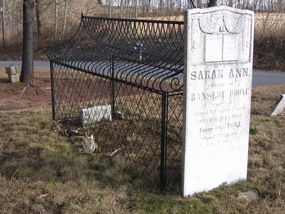
who lives next door who only exists on that day,” she explained.
The boy, Jax Aubrey, is an orphan, and the girl who lives next door is the key to a 2,000-year-old spell with its roots in the Arthurian legend.
This book represents a departure from her first two published books because it is a contemporary novel while her first two were historical.
“My first two books were also targeted toward an older audience,” Salerni said.
As her experiences in the book-publishing world have broadened, Salerni continued to incorporate her own writing assignments in her lesson plans for her students. For example, when she received a suggestion to transform a story that she had written from the first person point-of- view to the third-person point-of-view, she showed her students how the changes affected the story. She talks to them about all the choices that an author makes while writing a long story. She also shares the editing recommendations that she receives from her editors with the students.
Sometimes, Salerni said, the students object to the changes more than she does. But revising is an important part of the writing process, as her fourth- and fifth-graders are now understand.
“Whenever I ask them to write something again, they know that they had no room to complain because they knew how much rewriting I do.”
Salerni said that sharing her writing with students has helped her become a more effective teacher. She recalled an instance where a student who was a struggling reader had a complaint about reading her story, saying that he couldn’t understand certain parts as he was reading the story. He thought his reading comprehension skills were letting him down.
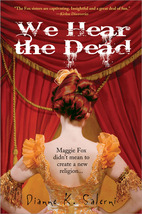
“All the questions that he had about the book were questions that he was supposed to have at that point in the story,” Salerni said. “He didn’t understand everything and he thought that it was his reading comprehension that was standing in his way. But the things that he didn’t know were the things that the reader wasn’t supposed to know yet. He didn’t understand that it was okay not to understand everything. That was an interesting moment for both of us.”
Now that she’s writing a book specifically for the age group that she teaches, the feedback that students give her is even more helpful.
“HarperCollins was very excited that I was involving students in this,” Salerni said.
Salerni’s burgeoning writing career has been a learning experience for her as well. Working closely with editors to make the necessary changes to get the book ready for publication is a challenge that she welcomes.
“I know that the editor will make this a better book than the one that I turned in to her,” she explained.
Working on more than one book at a time presents its own set of challenges, such as when she was simultaneously making edits to “Caged Graves” and writing “The Eighth Day.” The two books were aimed at different audiences so Salerni had to make sure that she paid strict attention to the age group that she is writing for.
“I had to make sure that the middle grade voice really came through for “The Eighth Day,” Salerni said.
She is still working on copy-editing “The Eighth Day” and last month turned in the draft for the second book in the series.
“Writing the second book was hard because it was the first one that I wrote that was under contract,” Salerni explained, adding that she was delighted when a publisher wanted to continue her characters’ story with more books.
“There was always hope for a series,” she said. “I knew there was the possibility of further adventures for these characters. I had to come up with a plan for three books with the possibility of extending it to five.”
The publishing company has asked her if she might be available to travel to promote “The Eighth Day,” which would be another new experience for Salerni.
“Most publishers have really pulled back on sending authors to places,” she said, “but I would expect that they would want to promote this book.”
The success that she’s enjoying now came after many years of hard work. Salerni worked diligently on her writing.
“I do a lot of writing on the evenings and weekends,” she said. “The time that I spend in the classroom away from writing is very beneficial.”
Her family has buttressed her writing efforts, starting with her husband who has always been there with encouraging words and good advice. He encouraged her to visit Catawissa, Pa. to do research for “Caged Graves.” When she was writing a book that included a scene on Mexico’s Pyramid of the Sun and she was worried about writing about one of Mexico’s most prominent landmarks without having seen it, Bob made arrangements for the trip.
“He took me to Mexico to climb the Pyramid of the Sun,” she said. “He’s been my photographer.”
“He’s been my photographer. He took me to Mexico to climb the Pyramid of the Sun.”
When Salerni was reluctant to share her fantasy novel with her agent, it was her husband who encouraged her to do so. But there’s nothing new about that. He has always encouraged her to take the next step with her writing.
“My husband has sent out more queries than I have,” she said with a laugh.
The support from her family extends to her daughters, Gabrielle and Gina.
“If I have a deadline, my kids will make dinner and even clean up afterwards,” Salerni said.
She said that her Avon Grove School District family has been very supportive as well.
“My students, their parents, and my coworkers have been so supportive of me,” she said. “It’s been very heartwarming.”
The support has helped her handle the ups and downs that every author faces.
“When you get rejected and things don’t go your way, you wonder if you should quit,” Salerni explained. “There’s a lot of people who just wouldn’t let me quit.”
As she prepares for the start of another school year, she’s very excited about her future opportunities as a writer.
“The three-book series was a very big, exciting thing for me,” she explained. “Having that three-book deal really takes me out of my comfort zone. I wasn’t sure if I could pull it off. But now, if I want to try an adult novel or a science fiction book, I feel like I can pull it off because I’ve already stepped outside my comfort zone and pulled off something that I didn’t think I could do.”
For information about Salerni and her books, visit www.diannesalerni.com.


